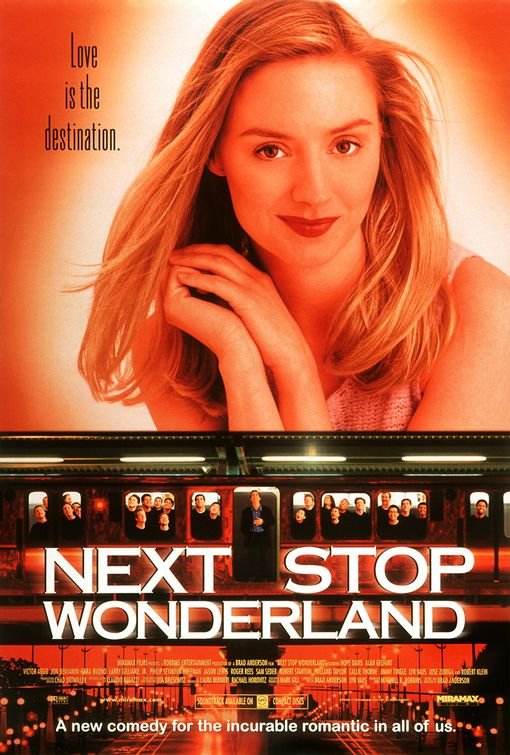Next Stop Wonderland (1998, dir. Brad Anderson, US) by Matt Olsen
Romantic comedies don’t tend to rate very highly in the pantheon of film classics and, based on most contemporary examples – where “contemporary” means anything produced in the last, say, fifty years – I’d contend that’s fair. Too often these films are weighed down by labored narrative gimmicks and cliched characters. “A career-focused heroine with no time for love pretends to get married in order to convince her conservative boss to award her the big promotion. What starts out as a make-believe ceremony accidentally becomes the real thing in The Wedding Fake.” Now, I just made that up but it could almost certainly be a storyline for any number of long-forgotten DVDs moldering in any number of long-forgotten storage units across North America.
It's remarkable then that 1998’s Next Stop Wonderland somehow manages to be both genuinely romantic and comedic with multi-dimensional lead characters in an original story that surprises while remaining firmly ensconced within a traditional Romantic Comedy architecture. Incredible? Impossible? Unrealistic? Indubitably! But as is true in any film of the genre those obstacles disintegrate in the face of true love and, I have to admit, I truly love this movie.
To be fair, the plot of Next Stop Wonderland could also be expressed in a condescendingly simple summary: “A newly single nurse and an ex-plumber/marine biology student drift through Boston and a string of near miss meetings until fate finally brings them together.” It’s accurate but fails to convey the tone which is – in my experience – unique to any film filed under RomCom.
Aside from establishing shots and the like, the camera is hand-held which creates a light and free feeling which nicely matches the soundtrack of samba and bossa nova songs from the classic Brazilian jazz era of the sixties and seventies. The music, cinematography, and performances color the film with a light melancholy at odds with the more standard tenor of these sort of films. When is the last time anyone ever described a romantic comedy as even approaching melancholy?
As expressed within the film, the lead heroine, Erin, is the physical embodiment of the Brazilian word “saudade” which suggests a feeling that is neither happy nor sad but both, simultaneously. She’s the opposite of the manic pixie dream girl trope; quiet, human, complex, and grown up. The consistent steadiness she gives the character grounds the entire film. And though there are many elements that contribute to the film’s success, a massive share of credit must go to Hope Davis, who is as unsurprisingly good here as she is in everything she’s done.
This film was released just two years after her “breakthrough” performance in the rightly celebrated The Daytrippers. Because she never reached the kind of ubiquitous presence and fame of bigger stars, it’s tempting to think of her as underappreciated, but then she was also in Synechdoche, New York which is, OF COURSE, one of the greatest films made in the twenty-first century. (Perhaps) interestingly, this film begins with a scene between Davis and that film’s lead, Philip Seymour Hoffman. Hoffman is high-pitched and hilarious in his small, introductory role here and serves as a perfectly erratic variable to Davis’ constant.
Her romantic counterpoint though is played by an actor, Alan Gelfant, whose most notable credit – for no explicable reason – is probably this movie. He gives every indication of being warm, intelligent, attractive, and totally believable. Like the film itself, it’s a mystery as to why he hasn’t been more widely appreciated.
Will the two strangers eventually meet and fall in love? To ask the question is to already know the answer. It is a romantic comedy, after all. While it doesn’t always behave exactly the way one might expect, the film is bound by certain ideals inherent in the genre. When the end comes though, it’s not a loud, wild parade through the streets. It’s more of a soft breeze coming off the sea. A little happy, a little sad, both at the same time.
Matt Olsen is a largely unemployed part-time writer and even more part-time commercial actor living once again in Seattle after escaping from Los Angeles like Kurt Russell in that movie about the guy who escapes from Los Angeles.


